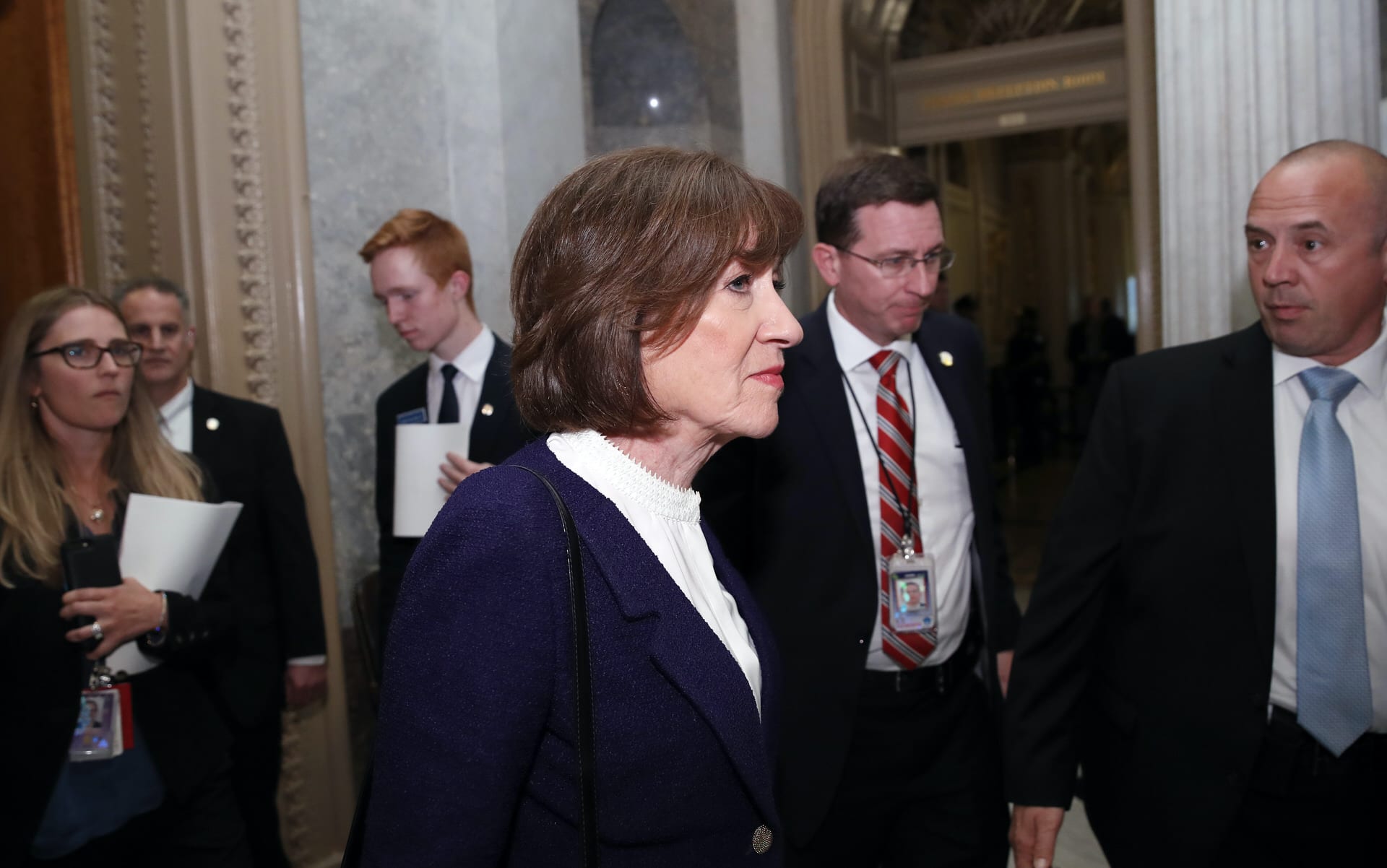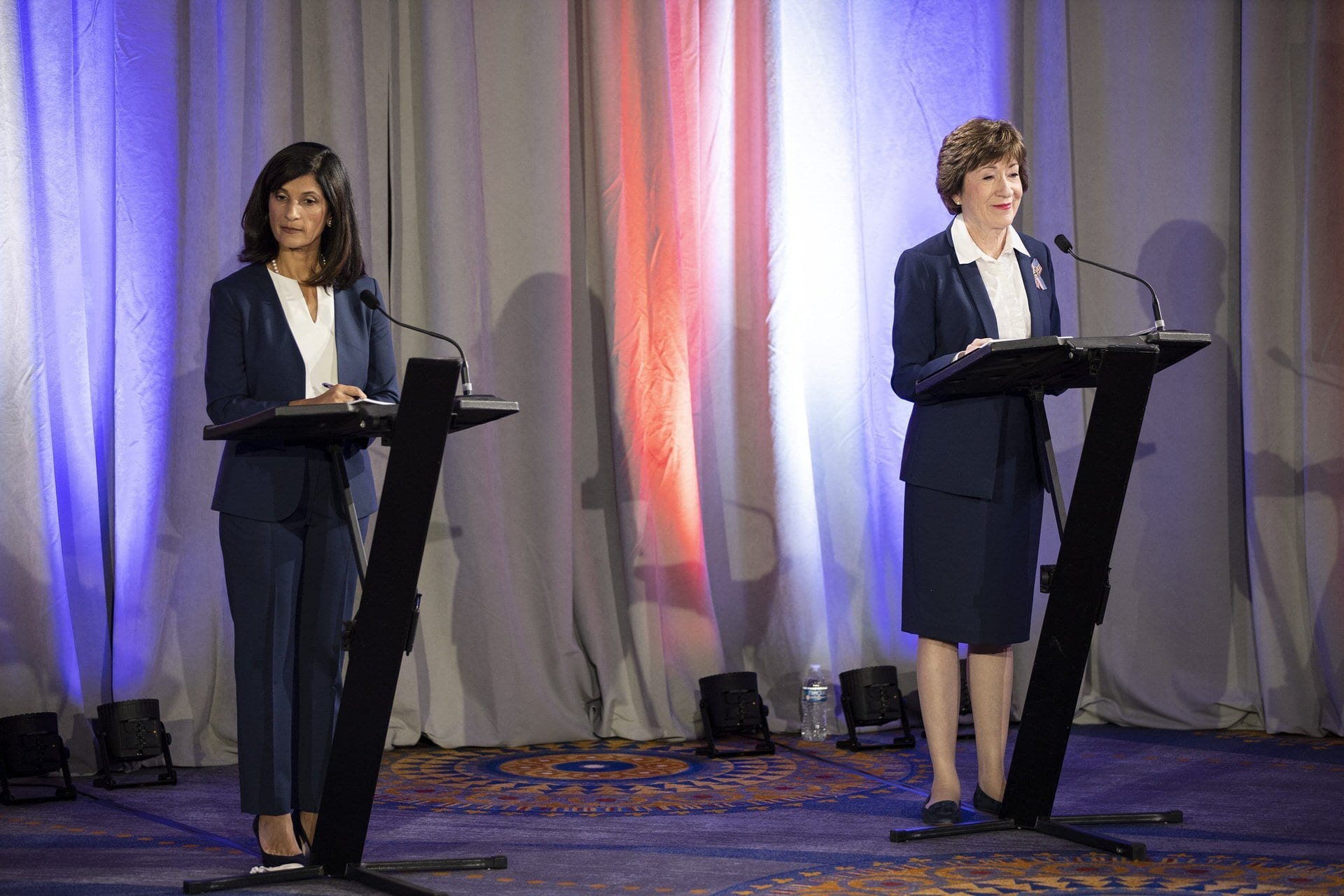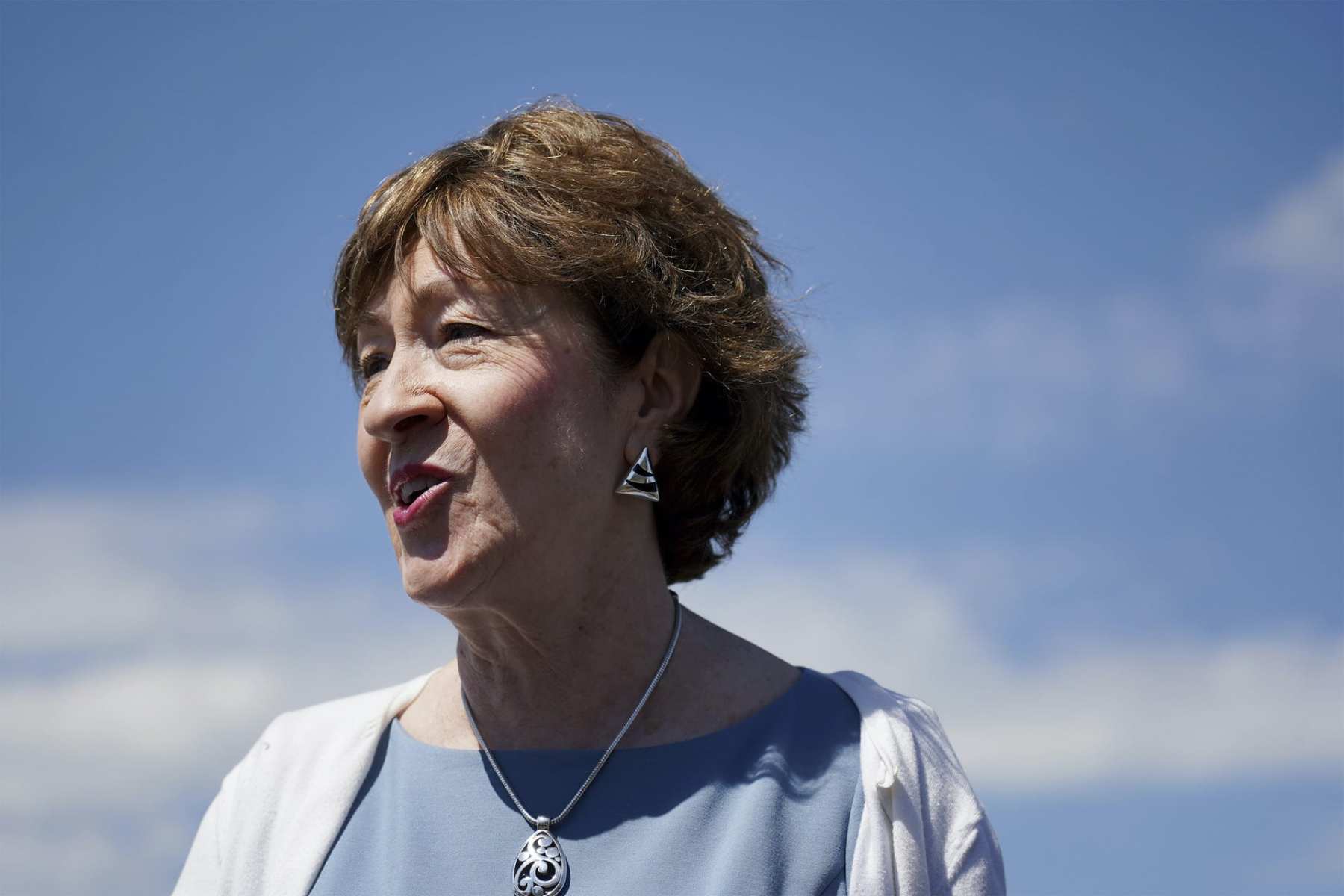RANGELEY, Maine — On a crisp, sunny day in late September, Susan Collins was on a campaign bus tour through Maine, the state she’s represented in the U.S. Senate since 1997.
Collins, up for reelection in November, had started the day’s bus tour at a sawmill in nearby Dixfield — “I’ve never seen such a sophisticated, high-tech mill, it is truly extraordinary” — and she would end it in Farmington at Gifford’s Ice Cream Stand, the company that produces the ice cream Collins serves with Maine blueberry pie when she hosts the weekly Senate Republican lunch.
In between, she took a walking tour of the business district in Rangeley, a mountainous, nearly all-White town in the western region of the state where the average annual household income is just under $60,000 — slightly less than the national average — and the year-round population of roughly 1,200 swells to more than 10,000 in the summer when tourists arrive. Collins dined with supporters at Moose Alley, a bowling and arcade center, then walked Main Street with a town selectman, stopping at the local hardware store, restaurants and a coffee shop.
During this quintessential campaign swing, it was easy to conjure what the previous three reelection bids, won by double-digit margins, may have looked like for the last Republican representing New England in Congress. Cars slowed down and drivers beeped their horns, leaning out windows shouting: “We love you, Susan!” and “Alright, Susie!”
But it wasn’t one of Collins’ past reelection bids. As Collins walked the streets of Rangeley, polls showed her underwater, trailing by an average of 6.5 points. Democratic challenger Sara Gideon, the 48-year-old outgoing speaker of the Maine House of Representatives, had as of June 30 raised $24 million to Collins’ $17 million, according to the nonpartisan OpenSecrets, with much of it from out-of-state.
“Look at this way: if it were any other year we wouldn’t even know who Sara Gideon is. This would be a slam-dunk, 60-40, 70-30 vote for Susan Collins,” said Moose Alley owner Nancy Bessey, a Collins supporter. “We only know about [Gideon] because people outside the state have decided to make us know about her.”
Just two years ago, Collins, a Republican from this frontier state where the prevailing political ideology has long been nonconformity, seemed poised for a smooth reelection to her fifth term.
Born into the fifth-generation of a lumber family in Aroostook, Maine’s northernmost county on the U.S.-Canada border, Collins, 67, cut her political teeth as an aide to William Cohen, a Republican representative and senator who famously broke with his party by voting to impeach Richard Nixon. After succeeding her mentor to the Senate in 1996, Collins coasted to reelection in 2002, 2008 and 2014 by 16-, 23- and 37-point margins, winning each of the state’s 16 counties even when a Democratic presidential candidate carried the state. She was in the top tier of the most popular senators and considered by some to be the most bipartisan. In 22 years, she had never missed a single vote.
Then, in 2018, Trump nominated Brett Kavanaugh to the Supreme Court, and everything changed for Collins, who ultimately voted to confirm him after weeks of national scrutiny.
“I don’t look at whether the person would be the individual whom I would appoint if I were president. That is not my test. I’m not a president; I’m a senator,” Collins said in a recent interview.
“I look at whether their political philosophy is within the mainstream, whether they’re qualified for the position and whether they have the experience for the position,” she added.
After the vote, Collins’ approval ratings went down and her unfavorables went up. Democrats saw her seat as an easy target to flip in 2020 to win Senate control. The race long ago became the most expensive in Maine’s history. Outside groups have spent more than $60 million supporting or opposing the two women. For months, Collins has trailed Gideon in polls, though one released on Tuesday showed Collins having narrowed the gap to one point.
Maine, a state of roughly 1.3 million that casts just four electoral votes and has largely been a nonfactor in presidential elections, has been thrust into the national spotlight like never before.
The narrative in the Maine Senate race — advanced since Gideon entered in June 2019 and echoed in media coverage — is that Collins is no longer the independent lawmaker that she once was. But has she changed over her years in the Senate?
Liberals lauded Collins when she helped “save” Obamacare in 2017. But she opposed President Barack Obama’s signature health care law when it first passed Congress in 2009 and 2010, along with then Maine Sen. Olympia Snowe, a fellow Republican. Last week, she was one of six Republicans who joined Democrats in a largely symbolic effort to protect individuals with preexisting conditions should the Supreme Court rule against Obamacare in a case it is expected to hear next month.
Collins voted in 2017 with her Republican colleagues to support a $1.5 trillion tax overhaul that delivered major savings to corporations and the wealthy, as well as eliminating the penalty for not complying with the Affordable Care Act’s “individual mandate.” But before voting, she asked for and received assurances from Senate Majority Leader Mitch McConnell that there would be votes on Obamacare market stabilization bills. The measures later stalled over partisan disagreement about abortion.
Last year, she voted against a Democratic amendment in a larger defense spending package that would block a U.S.-Mexico border wall’s construction, saying the amendment was too broadly written. Yet she’s also twice introduced measures to block Trump from diverting military funds to construct the wall, saying it was not about whether she supported or opposed the wall itself, but to prevent a presidential power grab. (Trump vetoed both.)
When the Senate began preparing for its impeachment trial early this year, Democrats saw Collins as a potential collaborator in their quest to call witnesses and review documents. She convened meetings with several like-minded Republicans to consider it. At the trial’s outset, she opposed the subpoena efforts, saying she wanted to stick to the sequence and process used during the impeachment trial of President Bill Clinton. By its end, she was one of two Republicans who voted to subpoena additional documents and witnesses, including Trump’s former national security adviser. The effort failed.
Collins ultimately voted to acquit Trump on both articles of impeachment. She reminded reporters that she broke with her party to do the same in 1999, when she was among only a handful of Republicans who voted to acquit Clinton on both impeachment counts that he faced. She told the New York Times earlier this year that she was “furious” with Clinton even as she voted to acquit him. Ahead of Trump’s acquittal, she lamented the president’s “poor judgement” and said she hoped he had learned a lesson.
Collins has earned a reputation as a moderate because she has at times been a critical swing vote. But the longtime senator is ideologically conservative, albeit with a more socially liberal bent than many of her colleagues. It is the conservativeness of her approach, more than anything, that dictates when she breaks with her party, and it is usually to uphold precedent or balance executive and congressional powers. She believes the system works, even in a time when that is up for debate.
“Her record, if anything, is almost a model of consistency, pretty much across the board,” said Mark Brewer, a professor of political science at the University of Maine.
As Collins was finishing up that late September campaign swing, news broke that Justice Ruth Bader Ginsburg had died. For many conservatives, the Supreme Court is a driving political force. For Collins, the court is what has troubled her current reelection bid.
When Trump nominated Kavanaugh, liberals believed he was skeptical of Obamacare and would not uphold Roe v. Wade, the 1973 Supreme Court ruling that legalized abortion nationwide. So they zeroed in on Collins, who supports abortion rights and had cast a deciding 2017 vote to protect Obamacare, as a potential ally willing to cross the president. After all, Collins had in the months before the 2016 election said publicly that she would not vote for him.
The group Mainers for Accountable Leadership began soliciting pledges and promised to funnel millions of dollars to Collins’ eventual Democratic opponent if she did not vote no on Kavanaugh — a move she characterized as bribery. In the U.S. Capitol, reporters keen to decipher the nominee’s chances trailed Collins, along with Sens. Jeff Flake and Lisa Murkowski, who were also thought to be potential party defectors in the chamber where Republicans held a slim 51-to-49 majority.
Collins’ political predicament grew more precarious after sexual assault allegations surfaced against Kavanaugh once his confirmation was underway. The FBI got involved. Protesters staged sit-ins wearing the red cloaks of the “Handmaid’s Tale,” a dystopian novel and television series. In addition to an initial two-hour meeting, Collins interviewed Kavanaugh for another hour by phone.
On October 5, 2018, word began to circulate that Collins would appear on the Senate floor to announce her vote. In a 43-minute speech, Collins said Supreme Court confirmation processes had been in partisan decline for 30 years and with Kavanaugh’s it had hit “rock bottom.” She had always opposed “litmus tests” for nominees, she said, and had “never considered the president’s identity or party” when she voted to confirm all six justices collectively nominated during her Senate career by Presidents George Bush, Barack Obama and Trump. She believed Kavanaugh would uphold court precedent related to Roe, she said, along with the Affordable Care Act and same-sex marriage.
Collins said she found Christine Blasey Ford’s testimony alleging that Kavanaugh sexually assaulted her “sincere, painful and compelling.” But, Collins continued, the witnesses who testified during the proceedings “could not corroborate any of the events.” It was not a criminal trial with a presumption of innocence until proven guilty, she said, but “fairness would dictate that the claims at least should meet a threshold of more-likely-than-not.” She did not think they did.
The next day, the Senate voted 50-to-48 to confirm Kavanaugh, with Sen. Joe Manchin being the only Democrat to vote in the affirmative. Murkowski voted “present,” and Republican Sen. Steve Daines missed the vote due to his daughter’s wedding. Collins and members of her staff received death threats. Former television network anchor Dan Rather said she had sided with the “old bulls” over women. Collins said later that she was sad, given her fulsome explanation at the time, that the Kavanaugh decision might cost her votes. Her approval ratings have declined ever since.

“I normally would not be one to put too much stock in one vote, in terms of changing a politician’s focus, but you can trace a lot of this, for Collins, back to the Kavanaugh vote,” Brewer said. “It was unlike any other vote for her. I thought, initially, it would create this firestorm and then it would die down, but it hasn’t.”
Collins points out that in addition to Trump’s two Supreme Court nominees (Kavanaugh and Justice Neil Gorsuch) she likewise voted to confirm those nominated by Obama (Justices Elena Kagan and Sonia Sotomayor) and Bush (Justices John Roberts and Samuel Alito). Her approach to lower-court nominees has been as consistent: Under four different presidents — two Democrats; two Republicans — she has voted to approve nearly every nominated federal judge, according to a 2020 analysis by the Portland Press Herald/Maine Sunday Telegram.
Even still, after Ginsburg’s death last month, Collins said she would not vote for a Trump Supreme Court nominee before the November election. The promise — made before Trump named appeals court Judge Amy Coney Barrett as his replacement — had nothing to do with whom the president might pick and everything to do with abiding by a precedent set during Obama’s presidency by McConnell, which the majority leader himself has abandoned.
Gideon nonetheless tried to keep focus on Collins’ judicial nominations record, airing an ad that accused Senate Republicans, Collins included, of “just rubber-stamping Trump’s judicial nominees.”
After a recent “Supper with Sara” near her home in Freeport, Gideon was more circumspect on the topic of just how much Collins has changed than some of her campaign ads. “There’s a degree to which perhaps she has changed. I also think that when Donald Trump is president and Mitch McConnell is majority leader it becomes much harder to sit on both sides of the issue, which is something that she loves to do,” Gideon said.
Both Collins and Gideon are running — if not as ideological moderates — as pragmatists, who say they want to put national partisan rancor aside in order to get things done for people in Maine. But the most-watched Senate campaign in Maine’s history, and among the most well-funded nationally, has not been without its own policy distortions, record misrepresentations and political acrimony.

One Gideon ad suggests that the Paycheck Protection Program (PPP), the coronavirus relief package that Collins played a key role in drafting and that she touts on the campaign trail, mostly benefits big donors and ignores small businesses. It was called a “misleading narrative” and given three (of four) “Pinocchios” by Washington Post fact checkers. Another from the campaign on Collins’ prescription drug record was described by fact checkers as “cherry picking” and presenting an “incomplete picture.” One from the outside group Maine Momentum, which is run by former staffers to Gideon and U.S. Democratic Rep. Chellie Pingree and does not have to disclose its donors, says Collins “voted for a tax bill that puts Medicare and Social Security in jeopardy.” That ad also received three Pinocchios.
The ad barrage turned more personal over the summer as both candidates ran spots about one another’s husbands. Collins pushed back against Gideon’s PPP ad by releasing one that highlighted how the law firm where Gideon’s husband works had received a $1 million to $2 million forgivable loan from the program. Gideon then ran one saying Collins is in a “perfect Washington marriage” with her lobbyist husband and that she has “pushed for policies that benefited his lobbyist business.” The Associated Press evaluated the ad’s claims as “unsupported” and said it offered “no proof.” The ad cited actions Collins took in 2011, before she was married. Her husband last registered as a lobbyist in 2006 and retired altogether in 2016.
Collins has waded into the muck in other ways. One recent ad from her campaign, which said that Gideon had “voted to defund” the police when she was on Freeport’s town council and direct the money to a nonprofit for which she was a board member, was rated as false. She has also implied that Gideon could do more to reconvene the legislature to deal with COVID-19; state Republicans have blocked Gideon’s effort.
Perhaps most striking in a state with one of the nation’s highest rates of registered female voters and women who cast ballots are the gendered attacks on Collins. The Lincoln Project ran an ad saying “Mitch McConnell and Donald Trump control her voice.” A mailer sent to voters this week, with no information about its funder, shows Collins in Trump’s embrace as he kisses the nape of her neck, saying she was “swept into the arms of a golden-haired hottie.” Collins has bristled at suggestions it is a man, and not she, who is responsible for her decisions.
Collins is trying to keep her focus local even as the country watches. Maine is the state with the oldest average population, and her Senate office has in recent weeks highlighted bipartisan efforts to improve access to osteoporosis testing and examine barriers women face to retirement security. Multiple times during her most recent debate, she brought up potato farming, an agricultural mainstay in the state’s northern region from which she hails. Collins is in line to be the top Republican on the appropriations panel — a fact that is brought up often by Maine’s pragmatic voters.
Her campaign released a new ad campaign this week highlighting a recent endorsement from Bill Green, a retired television personality familiar to nearly everyone in Maine. In one, he says: “Did you know that Susan Collins hates dogs? That’s kind of what I’m expecting to hear next from a ridiculous smear campaign.” Collins has a black Labrador Retriever.
Adding to the race’s uncertainty is the fact that in November, Maine will be the first state to use ranked-choice voting in a presidential election — a system that is untested but experts speculate could ultimately benefit Gideon over Collins.
After the ice cream stop in Farmington, Collins hypothesized about what had changed over the past two years, if anything, to make her race so competitive. It was clear she had given it some thought. She traced it back to before Trump’s presidency, and even before the 2011-2019 tenure of former Maine Gov. Paul LePage, a bombastic and divisive leader who liked to say he was “Donald Trump before Donald Trump.”
When she joined the Senate, Sen. John Chafee, a moderate Republican from Rhode Island, had counseled her to never campaign against a Senate colleague from either party, she said. That custom began to erode in 2004, when then Republican Senate Majority Leader Bill Frist — a “good friend” of Collins’ — campaigned against then Democratic Senate Minority Leader Tom Daschle.
Reporting and commentary have become “totally intermingled,” and “social media reinforces what people already think, rather than exposing them to alternative viewpoints,” she lamented. Then there is the “enormous amount of out-of-state money,” which has “taken a toll,” she said.
It has become more and more difficult to be a senator in the middle, whatever that might mean.
“It started with the growth of these groups on the far left and the far right who started to demand 100 percent adherence to 100 percent of their views 100 percent of the time. And if you didn’t? You were threatened with a primary or a massive amount of money being spent against you,” Collins said.
“That, to me, is what changed: our politics.”






